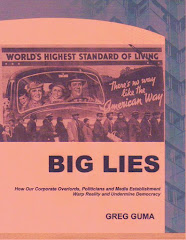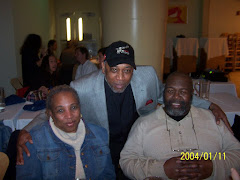 In a live “coast to coast” report to Pacifica Radio listeners on June 27, 2008, Nicole Sawaya, Executive Director since March, said that the biggest challenge facing the 59-year-old progressive media organization is deciding whether it is five stations or a network. Admitting that Pacifica currently faces “hard times,” marked by flat income and shrinking audiences, the self-proclaimed “reluctant ED” – an apt, familiar description, by the way – argued that the solution is to act like a network, embrace the digital future, and “create programming that makes Pacifica essential.”
In a live “coast to coast” report to Pacifica Radio listeners on June 27, 2008, Nicole Sawaya, Executive Director since March, said that the biggest challenge facing the 59-year-old progressive media organization is deciding whether it is five stations or a network. Admitting that Pacifica currently faces “hard times,” marked by flat income and shrinking audiences, the self-proclaimed “reluctant ED” – an apt, familiar description, by the way – argued that the solution is to act like a network, embrace the digital future, and “create programming that makes Pacifica essential.”The broadcast was unusual, the first time a Pacifica top manager has been able to address a national audience live – through all five sister stations – in many years. With station managers empowered to make programming decisions locally, simultaneous broadcast by Pacifica’s owned stations in New York, Los Angeles, Houston, Berkeley, and Washington, DC has been rare in recent years. The one-hour show, which included calls from listeners, gave Sawaya the chance to candidly discuss the organization’s accomplishments, potential, and difficulties. Although avoiding some hot topics – a 25 percent cut in funding for Free Speech Radio News (FSRN) and a financial crunch so serious that money for a national board meeting is hard to find, for example – she did acknowledge at one point that letters have gone out about possible staff cuts.
Looking at Pacifica as an ecosystem, she remarked that it’s “not sustainable,” but promised that “no asset will be sold.” The pledge is significant, since the rumor that the National Board was considering the sale of a station helped fuel large protests in the late 1990s. Although Pacifica is “not a movement,” she argued, it is “a public trust and should not be leveraged.”
On the other hand, Sawaya said, “I prefer a network” to a “low bar of entry.” Since Pacifica’s reorganization in 2002, it has become “so flat it’s concave,” she continued, and this has raised the question of “where does leadership belong?” Later, she joked that “in the lexicon of Pacifica, management is a dirty word.”
Despite financial pressures, Sawaya is determined to produce more national broadcasts. During the report, she pointed to coverage of Gay Pride events, hearings on torture covered via KPFA by Larry Bensky, and the recent Winter Soldiers hearings, which were ignored by most commercial media. Later in the summer, she noted, Pacifica will provide its own national coverage of the Democratic, Republican and Green Party conventions.
Looking further into the future, she spoke of a “generational hand off” linked to the shift toward digital distribution and the need to “connect the country together” through new programs such as an “environmental watch” show. In recent years, she noted, “our discourse has declined.” But she feels that the blogosphere provides a new model and pointed to Pacifica founder Lew Hill’s on-air roundtable discussions, noting that they didn’t become “a food fight” or “dumbed down.”
Her conclusion is that the organization needs to be “more inclusive, and not afraid.” However, she added, “I don’t have a vision. I’m just a worker trying to knit together the best programs.”
Sawaya fielded more than a dozen calls during the broadcast, with questions and comments on transparency, moving WBAI from its expensive Wall Street location, editorial priorities, tenure limits for producers, international coverage, and whether she feels emotional and embattled. Though she shrugged off the latter concern, saying “I’m just wired that way,” she admitted that the financial problems are serious and she’s anxious to provide “economies,” efficiency, and better service.
In response to the question about New York station WBAI’s location and budget troubles, she noted that moving the station, as well as WPFW – whose lease in Washington, DC runs out soon – raises the question of whether stations should focus on “bricks and mortar” or “scale it down.”
Sawaya – who served as flagship station KPFA’s General Manager briefly in the late 1990s before being abruptly dismissed – returned as Pacifica’s top executive last September. The vote was unanimous, but she was the only candidate interviewed in person. Although given a five-year contract, she unexpectedly resigned in early December – to widespread surprise and disappointment. In the three months that followed, however, she negotiated privately with the board and agreed to return in early March. The details of the negotiations are confidential, but one of her first public struggles was to assert more oversight of finances, including over Chief Financial Officer Lonnie Hicks and his staff. After a series of meetings the board basically backed her position.
That success was followed closely by the public admission that Pacifica is being forced to cut back on spending. As Sawaya searched for a way to pay for national programming, FSRN received word that funding for its daily half-hour international newscast would be cut by more than $13,500 a month – effective immediately. According to an FSRN press release, “The reduction represents about a 25% cut in income for the grassroots news collective. Since FSRN is barred from on-air fundraising, it must seek to offset the cut with income from affiliates, foundations and individuals.” As of late June, an on-line petition to the Pacifica National Board had been signed by almost 400 people. It says:
A Board committee was established to consider options, and subsequently recommended that the meeting be held anyway. The Board itself chose July 25-27 (an effort to rescind that decision failed) and instructed the committee and management to select one of three Washington, DC locations. The choices include Howard University or Gallaudet University (a school for the deaf and hard of hearing), both in Washington, or the National Labor College in nearby Silver Spring, Maryland.
At the end of the broadcast, Sawaya remained optimistic, pointing to the potential of launching “multiple streams” through the Internet and high definition radio (already in use at Houston station KPFT). When the last caller argued that Pacifica isn’t typical and operates in an “interactive” rather than a “one way” manner, she heartily agreed. “It’s a two-way street,” she replied.































No comments:
Post a Comment